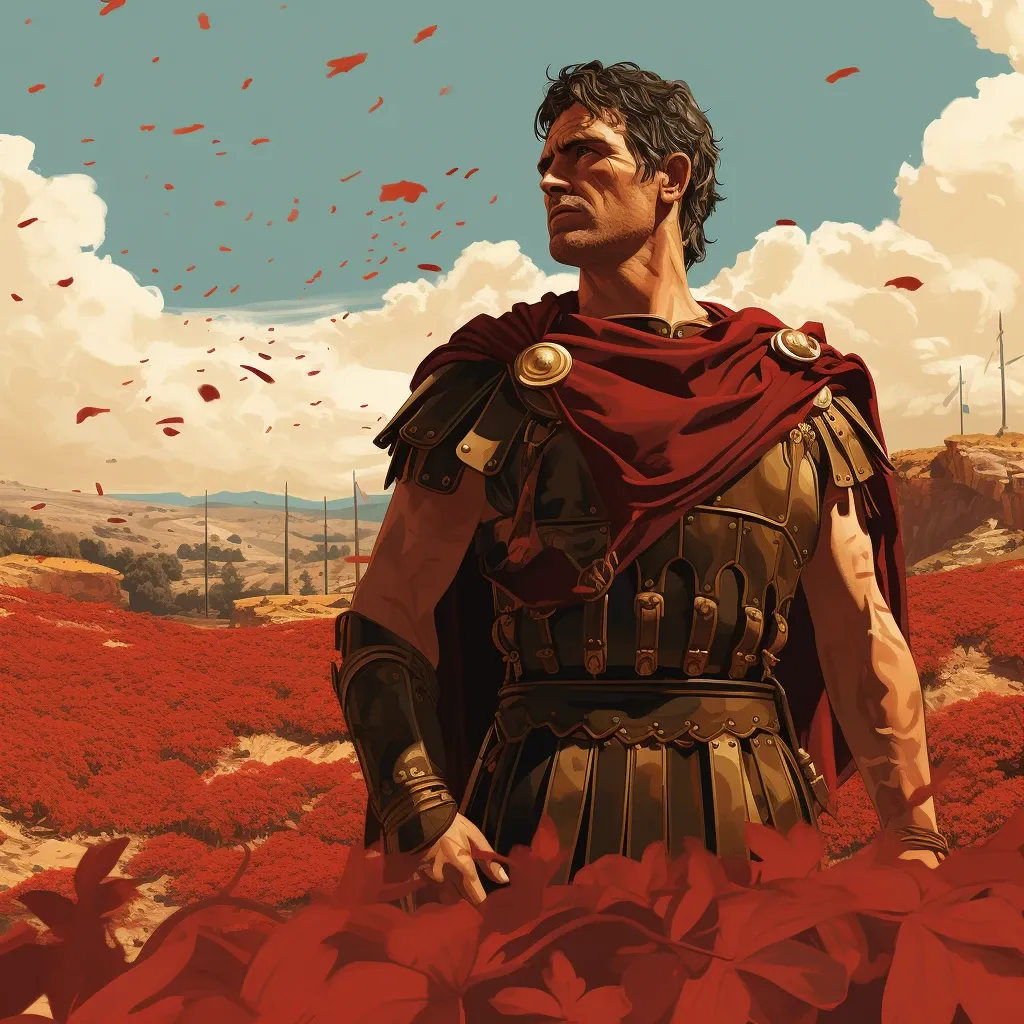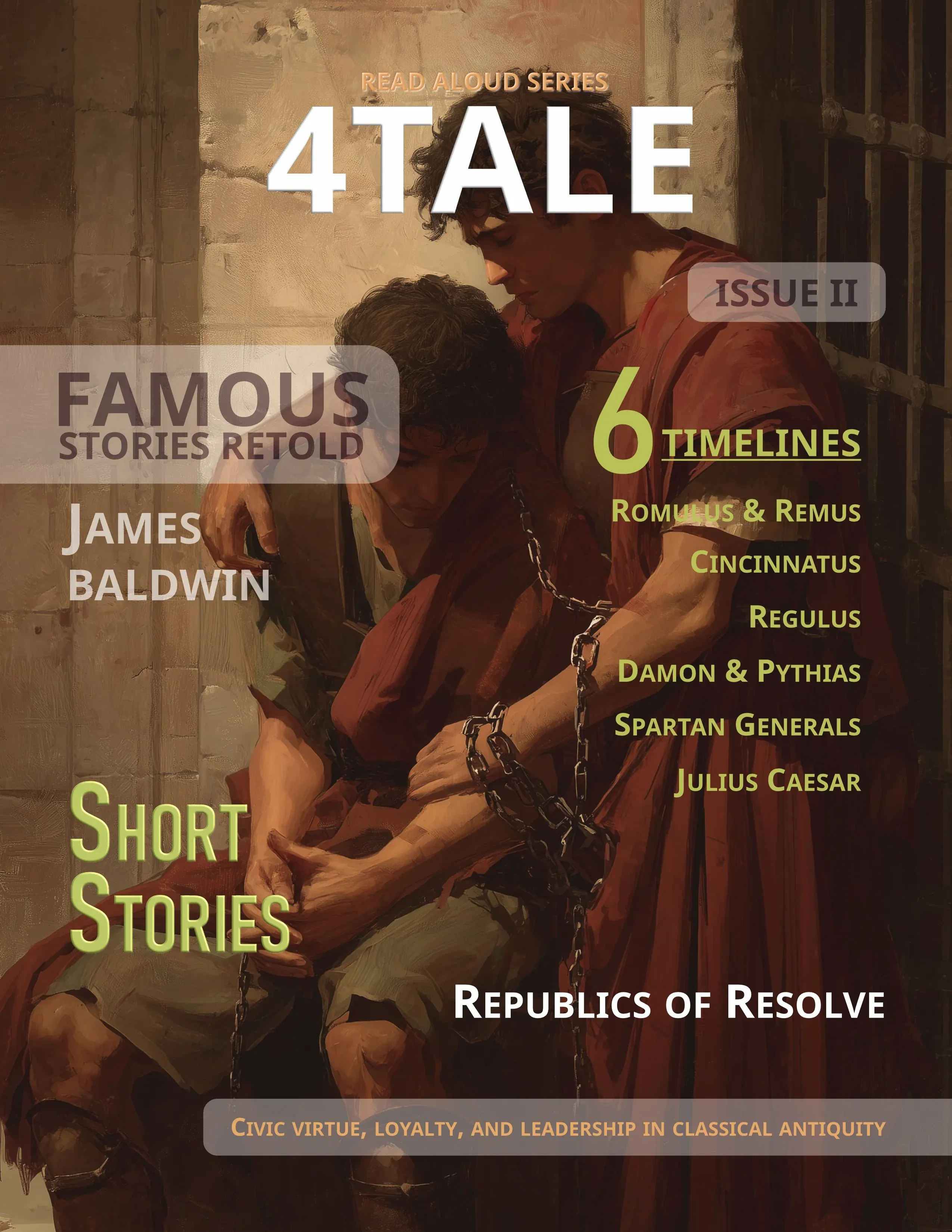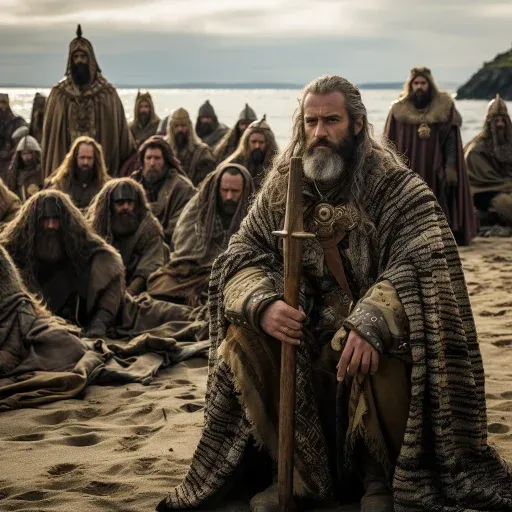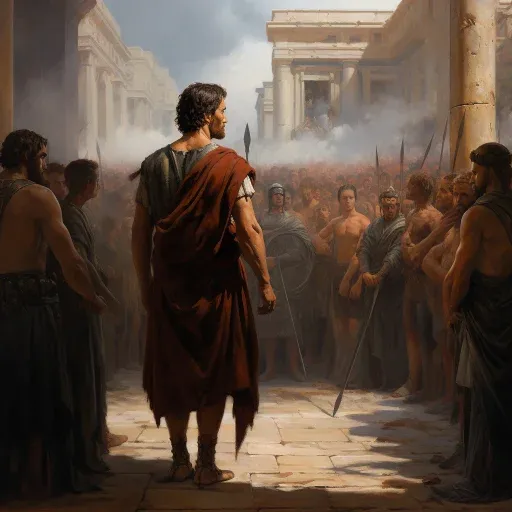BY JAMES BALDWIN
The Story of Cincinnatus
Famous Stories Retold: Story 24 of 50

Heading

Roman Patriot: Cincinnatus was a Roman farmer who was called upon to save Rome from invasion.
Historical Influence: Cincinnatus’ story influenced later leaders and thinkers, including the Founding Fathers of the United States.
A good book we like, we explorers. That is our best amusement, and our best time killer
- Roald Amundsen, Explorer
The Heroic Tale of Cincinnatus: Rome's Humble Saviour
In history, some stories stand out as timeless parables of virtue and valor. Among these is the tale of an unassuming Roman farmer named Cincinnatus, thrust into the limelight by an extraordinary set of circumstances. His story, a testament to the power of humility and selflessness, holds valuable lessons for every generation. It's a tale that unfolds against the backdrop of a besieged Rome, where the fate of the city depended on one man's courage and wisdom. Join us on this historical journey, as we delve into the life of Cincinnatus, shedding light on how he saved Rome and forever etched his name in history.
The Humble Beginnings of Cincinnatus
Cincinnatus, a man of Roman roots, lived a simple life on a small farm not far from the city of Rome. Once upon a time, he was a man of wealth and power, holding the highest office in the land. However, due to a series of events, he had lost all his riches and was reduced to a life of poverty. This, though, did not diminish his stature or respect in the eyes of his countrymen. Living in an era when tilling the soil was considered a noble profession, Cincinnatus did not shy away from doing his own work on his farm. His humble beginnings and the simplicity of his lifestyle spoke volumes about the man he was.
Cincinnatus: The Respected Counselor
Despite his humble circumstances, Cincinnatus was a man of remarkable wisdom and justice. His reputation as a wise counselor was known far and wide. His neighbors had immense faith in his judgment and would often seek his guidance in times of trouble. Their trust in him was such that the common saying among them was, "Go and tell Cincinnatus. He will help you." In this way, Cincinnatus became the respected counselor for the people of Rome, offering advice and aid to those in need.
Podcast
The Threat Looming Over Rome
At this time, a tribe of fierce, half-wild men living in the nearby mountains posed a significant threat to the Roman people. These men, fueled by their hostility towards Rome, formed an alliance with another tribe of warriors. They advanced towards the city, ravaging and looting everything in their path. Their bold declaration of tearing down the walls of Rome, burning the houses, and enslaving its women and children posed a serious threat to Rome's existence. The Romans, known for their bravery and pride, initially dismissed this threat, believing that their army, the finest in the world, would easily drive away the mountain men. However, the gravity of the situation soon became apparent, leading to a desperate call for help and the rise of Cincinnatus as the savior of Rome.
The Desperate Call to Cincinnatus
In the midst of the mounting chaos, the wisdom of Cincinnatus was invoked. While he was in his field, plowing with earnest simplicity, he was interrupted by the urgent arrival of messengers from Rome. Their plea was desperate and their words weighed heavy with the fate of Rome. "Put on your cloak, Cincinnatus," they implored, "and hear the words of the Roman people."
Confounded by their urgency, Cincinnatus inquired about the welfare of Rome. Once cloaked, he listened to the dire news of the entrapped Roman army, the impending danger to the city, and the desperate plea of the people. The Roman people, in their hour of need, had chosen him as their ruler, entrusting him with the task of leading their city to safety. The urgency of the situation left no room for hesitation, and Cincinnatus, leaving his plow behind, rushed to the city to take up the mantle of leadership.

Cincinnatus: The Savior of Rome
With the power vested in him, Cincinnatus swiftly took command. He armed the guards and boys of Rome and led them fearlessly against the formidable mountain men. His strategic acumen and his courageous leadership turned the tide of the battle, rescuing the entrapped Roman army and driving the mountain men back to their territories.
The news of the victory brought immense joy to the city of Rome. The triumphant return of the Roman army, led by Cincinnatus, was a sight to behold. Banners waved in the air and the city echoed with the cheers of their hero. Cincinnatus, once a humble farmer, had risen as the savior of Rome.
Return of Cincinnatus: The Humble Hero
Amid the jubilant celebrations and the clamor of praise, Cincinnatus remained a humble hero. He could have easily seized this moment of glory to ascend to the throne and become king. His word was law, and no one would have dared to oppose him. Yet, he chose to return the power to the white-haired Roman Fathers. He stepped down from his position, leaving behind the grandeur and power of ruling Rome.
His sixteen days as the ruler of Rome ended as abruptly as they had begun. With the same stoic demeanor, he returned to his humble life on the farm, to the plow he had left behind. The story of Cincinnatus is the embodiment of true nobility and humility, a tale that echoes through the corridors of time.
Conclusion
In the compelling narrative of Cincinnatus, we witness the embodiment of true heroism. Shunning glory for the tranquil life of a farmer, he reminds us that greatness often resides in simplicity. The tale of Cincinnatus, the humble hero who saved Rome, underscores the significance of wisdom, courage, and selflessness. His ability to relinquish absolute power and return to his humble beginnings is a testament to his character, one that echoes through time. His story serves as a beacon, illuminating the path of virtue, and reminding us that true heroes are often those who seek not fame, but the welfare of their people.





